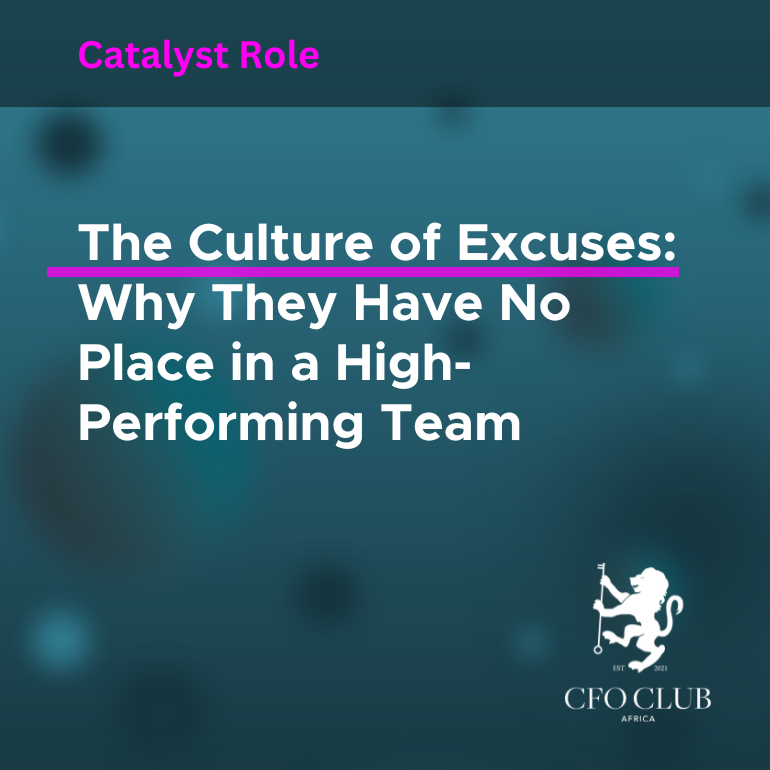The Culture of Excuses: Why They Have No Place in a High-Performing Team
When assembling a team, one principle must remain steadfast and non-negotiable: excuses have no place. Excuses undermine progress, subtly disrupt momentum, and create obstacles that prevent leaders from overcoming the crucial early hurdles every venture faces. To build a high-performing team, leaders must eliminate the culture of excuses and foster a mindset of accountability, adaptability, and ownership.
The Culture of Excuses
Excuse-making is more than just a bad habit—it’s a culture. In environments where excuses are tolerated, accountability takes a backseat. Instead of focusing on solutions, teams become adept at justifying failure or mediocrity. Blame thrives, results suffer, and the organisation stagnates.
Excuses shift attention away from what matters: finding solutions, adapting to challenges, and achieving goals. They create an atmosphere where the question isn’t, “How do we fix this?” but “Why wasn’t it my fault?” This mindset is toxic to progress and especially detrimental during the critical early stages of a project or venture, where adaptability and determination are paramount.
The Leader’s Role in Eliminating Excuses
As a leader, it’s your responsibility to set the tone for your team. If you accept excuses, even passively, you risk fostering a culture where accountability erodes. Leaders must instead champion a mindset of ownership, adaptability, and problem-solving.
Here’s why these matters: every initiative faces resistance, especially in the beginning. Whether it’s launching a new product, scaling a business, or implementing a transformative strategy, the early stages are marked by steep learning curves, unforeseen obstacles, and high stakes. Teams that indulge in excuses falter under this pressure, while teams that embrace accountability thrive.
Building an Excuse-Free Team
Creating a team that rejects excuses requires deliberate action. Here are the key strategies:
- Lead by Example: Leaders must embody the principles they expect. If you make a mistake, own it. If you face a challenge, tackle it head-on. Demonstrate resilience and a solutions-oriented mindset.
- Set Clear Expectations: From the start, communicate that excuses will not be tolerated. Clarify that while challenges and setbacks are expected, the focus must always be on finding solutions and moving forward.
- Reward Ownership: Celebrate team members who take responsibility and seek solutions, even in the face of failure. This reinforces the behaviors you want to see and motivates others to follow suit.
- Address Excuses Immediately: When excuses arise, address them directly and constructively. Help team members reframe challenges as opportunities for growth and problem-solving.
- Foster a Growth Mindset: Encourage your team to view obstacles as a natural part of progress. Equip them with the tools, support, and mindset to learn from setbacks rather than retreat into excuse-making.
The Payoff of an Excuse-Free Culture
When a team operates without excuses, momentum becomes unstoppable. Individuals take initiative, problems are resolved faster, and progress accelerates. A culture of accountability creates space for innovation, trust, and collaboration—all of which are essential for long-term success.
More importantly, an excuse-free culture empowers leaders. Instead of wasting energy managing resistance or justifying delays, leaders can focus on driving vision, aligning strategies, and achieving goals. This is the ultimate competitive advantage in any venture.
Final Thoughts
Excuses may feel harmless at the moment, but their cumulative effect is devastating. They derail momentum, weaken accountability, and undermine the potential of even the most talented teams. By refusing to tolerate excuses and fostering a culture of ownership, leaders can unlock their team’s full potential, driving progress and achieving extraordinary results.
In the end, the choice is simple: accept excuses and stagnate or reject them and thrive. Which will you choose?

